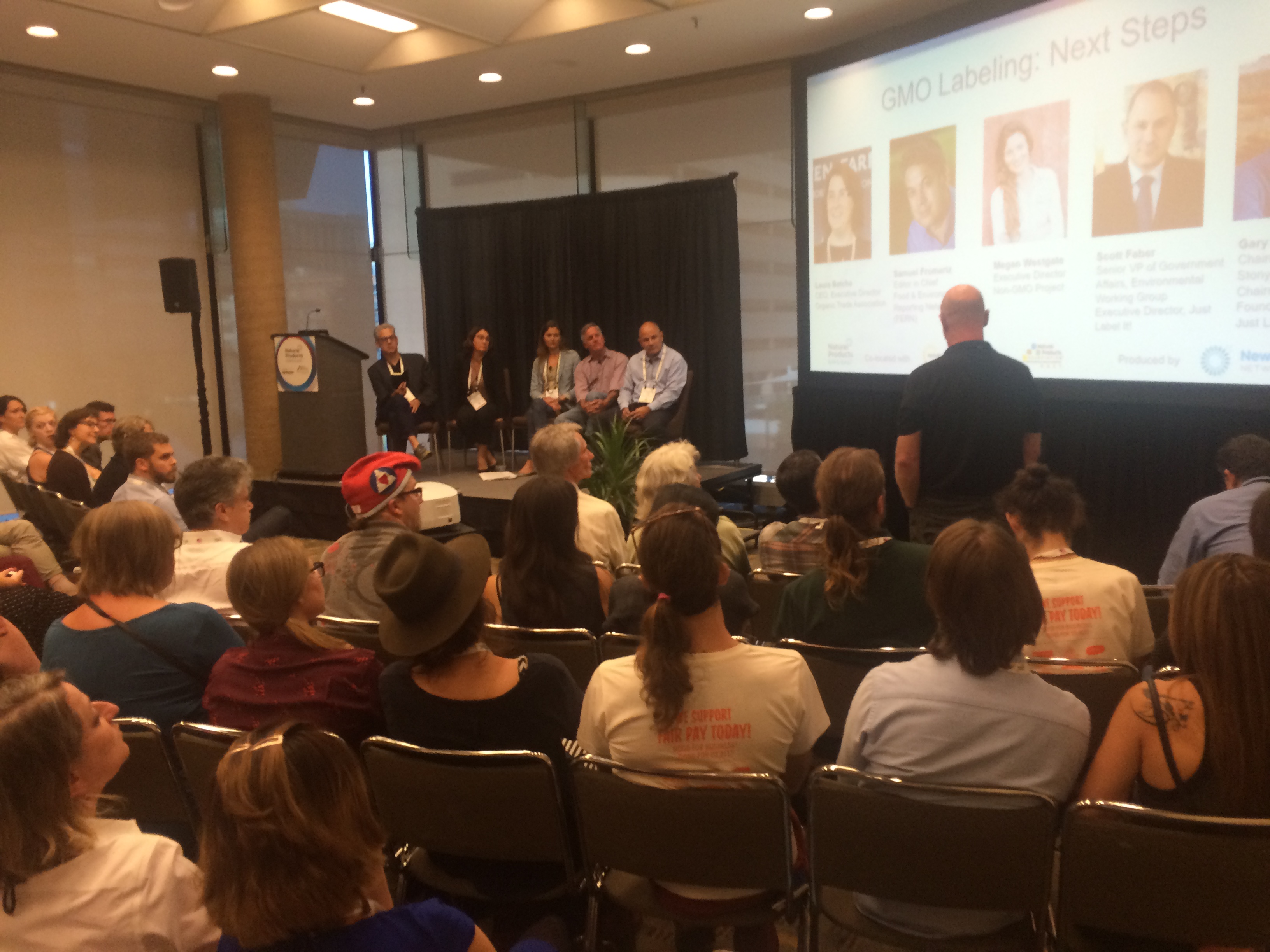The rift in the organic food community over the new GMO labeling law was in full view at a recent educational session on the law at Natural Products Expo East. Grassroots GMO labeling advocates, such as David Bronner, CEO of Dr. Bronner’s, accused the Organic Trade Association (OTA) of betrayal, while OTA executive director Laura Batcha defended her group’s action in supporting the law.
“Betrayal and mistrust”
“We are fractured as a movement right now. There is a lot of betrayal and mistrust,” said Megan Westgate, executive director of the Non-GMO Project, describing the sentiment among attendees of a meeting of GMO labeling advocates in July.
Westgate described the “Bioengineered Food Disclosure Standard,” which President Obama signed into law in July, as a “really bad law,” but said “maybe we can make it a little better.”
GMO labeling advocacy groups opposed passage of the bill, which they labeled the DARK (Deny Americans the Right to Know) Act while OTA supported the bill because it included protections for the organic industry.
The law allows food companies to use smart-phone enabled QR codes to disclose GMO content.
Law allows organic products to be labeled non-GMO
Batcha acknowledged problems with the GMO labeling law, while saying it was a step forward and that getting GMO labeling passed was an “enormous goal.”
“Aspects of law are disappointing particularly around the use of QR codes,” she said. “As a compromise there were some achievements.”
Batcha said OTA supported the bill because Congress was going to pass it anyway, and that it was important to protect the organic industry.
“As an organization, my job is to protect organic food in the marketplace,” she said. “We prioritized organic and wanted to make sure that organic wasn’t going to be damaged by the bill.”
The law allows organic foods to make non-GMO claims based on organic certification alone; non-GMO verification wouldn’t be needed.
“Our membership believes organic products should be able to make non-GMO claims,” she said.
Batcha said OTA is committed to working with the U.S. Department of Agriculture to make the law better.
“Congress gave USDA great authority (to develop this law),” she said. “We are committed to being at the table to push this forward.”
“Need to show USDA we are interested in this”
Gary Hirshberg, chairman of Stonyfield Farm and Just Label It, also said it was necessary to be involved in developing the law.
“We need to show USDA we are interested in this,” he said. “You can bet the other side is. We need to be there. We’ve got a stake in this.”
He said many details about the bill still need to be clarified such as the definition of genetically engineered foods and whether it includes new GMO technologies such as gene-editing, GMO thresholds for labeling, exemptions for certain ingredients and for small food manufacturers, among other things.
Hirshberg said the USDA planned to conduct a consumer survey on the viability of QR codes, yet the agency doesn’t even have funding for it.
In advocating for an on-package labeling statement, Hirshberg said that QR codes are another way for food companies to hide GMOs in their products and that there were a “million” problems with the technology.
“We should embarrass the hell out of companies that use QR codes,” he said.
“People gave up and betrayed the movement”
Batcha said the debate over the labeling law “has been a challenging experience for us.” She said her staff has received “ill wishes” from opponents of the law over OTA’s support for the law.
“It hasn’t been kind on the people. I hope we can do better than that,” she said.
But Bronner said it was not for OTA to decide the best course of action for the whole labeling movement
“We had people give up and betray the movement,” said Bronner, whose company recently resigned from OTA over the group’s support for the law.
Batcha replied that she understood Bronner’s frustration but said: “At the end of the day if there is a threat to organic and I have to make a call, I’m going take action.”
After being shown his image on a billboard labeled as a traitor, Hirshberg defended his group’s work on the GMO labeling bill. “We were absolutely against the bill and I don’t regret what we did.”
Consensus: “to have more food certified organic and non-GMO verified”
Other audience members aired grievances. Michael Potter, CEO of Eden Foods, said that the USDA is “totally corrupt” and expressed distrust of OTA. An organic farmer told Batcha that she never felt that OTA represented her interests. Steven Hoffman, director of Compass Marketing, asked what would happen if the media tests organic foods and finds they contain GMOs. Alexis Bayden-Mayer, political director of the Organic Consumers Association, passed around a letter urging companies to resign from OTA.
A representative from Organic Valley said: “We will have to decide whether to fight together or fight amongst ourselves and lose.”
Despite the divide, Westgate remained optimistic, citing the “amazing grassroots” group that has been created over the past few years that has raised awareness about the risks of GMOs nationwide. She said there was something everyone could agree on.
“One strongest sense of consensus and our end goal is to have more food certified organic and non-GMO verified and produced in a sustainable way,” she said.





